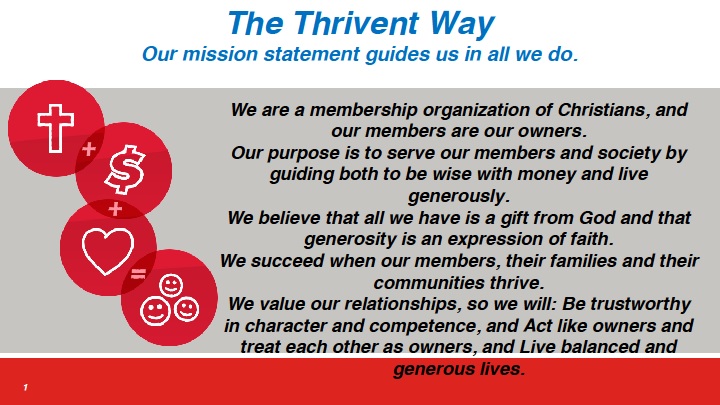Thrivent CEO Brad Hewitt: history goes back to Luther’s Fraternal Agreement, Luther: matters determined by Christian love and not by strict human justice
From The Washington Post March 28, 2014.
“CEO Brad Hewitt told the 1,600 members at the regional meeting at the Henry Ford Museum that while Thrivent traces its corporate roots to the turn of the 20th century, its history goes back to the 16th century and the founder of Protestant Christianity, Martin Luther.
Luther drafted a document in 1523 called the “Fraternal Agreement on the Common Chest of the Entire Assembly at Leisnig,” which established rules about pooling resources to help people in need.
“The phrase he used consistently was, ‘This is done for the honor of God and the love of fellow Christians,’” Hewitt said, adding that Thrivent was formed by Lutheran immigrants for the same basic purpose.
Moeller said the company chose to use the Apostles’ Creed — a statement of Christian belief dating back to the 4th century — as the determining factor in whether a person is eligible to join Thrivent.”
Read More:
From the “Ordinance of a Common Chest” by Martin Luther.
Preface
“To all Christians in the congregation of Leisnig, my dear sirs and brethren in Christ: Grace and peace from God the Father and our Savior Jesus Christ.
Dear sirs and brethren. Since the Father of all mercies has called you as well as others to the fellowship of the gospel, and has caused his Son Jesus Christ to shine into your hearts; and since this richness of the knowledge of Christ is so active and powerful among you that you have set up a new order of service,37 and a common fund after the example of the apostles [Acts 2:44–45; 4:32–35], I have seen fit to have this ordinance of yours printed, in the hope that God will so add his gracious blessing that it may become a public example to be followed by many other congregations, so that we, too, may boast of you, as St. Paul boasted of the Corinthians that their effort stirred up many others [2 Cor. 9:2]. Nevertheless, you will have to expect and take comfort from the fact that if what you are undertaking is of God it will necessarily meet with vigorous opposition, for Satan never rests or takes a holiday.”
“Those individuals in our parish and assembly who are impoverished by force of circumstances and left without assistance by their relatives, if they have any capable of helping, and those who are unable to work because of illness or old age and are so poor as to suffer real need, shall receive each week on Sunday, and at other times as occasion demands, maintenance and support from our common chest through the ten directors. This is to be done out of Christian love, to the honor and praise of God, so that their lives and health may be preserved from further deterioration, enfeeblement, and foreshortening through lack of shelter, clothing, nourishment, and care, and so that no impoverished person in our assembly need ever publicly cry out, lament,93 or beg for such items of daily necessity.”
“FRATERNAL AGREEMENT ON THE COMMON CHEST OF THE ENTIRE ASSEMBLY AT LEISNIG
IN THE NAME OF THE HOLY UNDIVIDED TRINITY, AMEN.
Since by the grace of the Omnipotent God, through the revelation of the Christian and evangelical Scriptures, we have been given not only firmly to believe but also profoundly to know that, according to the ordinance and precept of divine truth and not according to human opinion, all the internal and external possessions of Christian believers are to serve and contribute to the honor of God and the love of the fellow-Christian neighbor, we the nobility,58 council, craft supervisors,59 gentry,60 and commoners dwelling in the city and villages61 of the assembly and parish of Leisnig, by these presents confess and make known that we, for ourselves and our posterity, upon the considered and mature counsel of men learned in the divine Scriptures,62 have drawn up and adopted the following fraternal agreement among ourselves as a community, and that both now and for the future it is to be held true and inviolable, namely:”
“PROPERTY, RESOURCES, AND RECEIPTS FOR THE COMMON CHEST
In order that our Christian faith — in which all the temporal and eternal blessings won by our Lord and Savior Christ out of pure grace and mercy are granted unto us by the eternal God — may bear fruit in brotherly love, and this love truly express itself in deeds of tender kindness, we, the aforesaid general parish assembly, acting unanimously, for ourselves and our posterity have ordained, established, and set up a common chest, and by these presents we do now ordain, establish, and set up this same chest on the authority of this our fraternal agreement as to purpose, scope, and form, as follows.”
“THE DIRECTORS TO MEET TOGETHER EVERY SUNDAY
Every Sunday in the year, from eleven o’clock until two hours before vespers, the ten directors shall meet in the parsonage or in the town hall, there to care for and exercise diligently their trusteeship, making their decisions and acting in concert in order that deeds of honor to God and love to the fellow-Christian may be continued in an unbroken stream and be used for purposes of improvement. These decisions of theirs shall be kept in strictest confidence and not be divulged in unauthorized ways. If any of the directors are from time to time absent for good and sufficient reason, the majority shall have the power to go ahead anyway and transact business.”
“The ten thus duly elected shall immediately assume the burden and responsibility of administration and trusteeship of the common chest. They shall do so voluntarily and with a good Christian conscience, for the sake of God and the general welfare. They shall discharge their duties to the best of their ability, without regard to favor, animosity, personal advantage, fear, or any unseemly consideration, and shall be pledged and bound faithfully and honestly to handle the administration, receipts, and disbursements, according to the terms of our agreement herein described.”
Read more:
https://files.lcms.org/wl/?id=dEfiB2alNeGyyJljaBOCrxGyDAmQfq1f
The following quotes by Luther and taken from the above, are particularly relevant in accessing how well Thrivent has embraced Luther’s Christian intent:
“matters are to be determined by Christian love and not by strict human justice.”
“Now there is no greater service of God than Christian love which helps and serves the needy, as Christ himself will judge and testify at the Last Day, Matthew 25[:31–46].”
“This is why I said that Christian love must judge and act in this matter; it cannot be handled by laws and regulations.”
From my experience with Thrivent, they have utterly failed.



